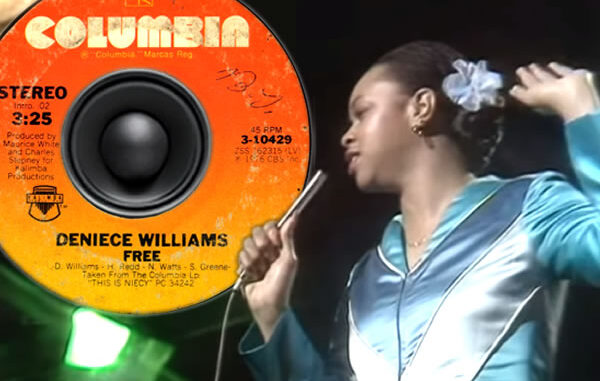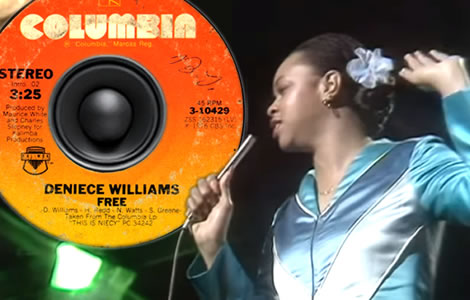
Deniece Williams’ 1976 smash hit “Free” remains a timeless, soulful track that continues to captivate audiences worldwide.

The song’s enduring appeal is due to its distinctive blend of soft R&B and a sense of liberation and freedom. Williams’ angelic vocals paired with the song’s elegant production make “Free” an iconic and refreshing track, no matter how many times it’s played.
Its presence on radio playlists even today demonstrates its lasting relevance.
Composition and Recording
“Free” was written by Deniece Williams, Hank Redd, Nathan Watts, and Susaye Greene. Williams, who had been a backup singer for Stevie Wonder before embarking on her solo career, infused the song with personal meaning.
Lyrically, “Free” reflects a yearning for independence and self-liberation, themes that resonated deeply with listeners. The song’s minimalist arrangement, with a focus on Williams’ soaring, crystal-clear voice, allows the lyrics to take centre stage. The production is gentle yet precise, reflecting the sophisticated R&B sounds that were popular in the mid-70s.
The recording took place at the renowned Motown Hitsville studio in Los Angeles.
Produced by Maurice White and Charles Stepney of Earth, Wind & Fire fame, the track benefits from a lush, atmospheric production that complements Williams’ delicate vocals. White and Stepney were known for their ability to bring out the richness of an artist’s voice, and they did so beautifully with Williams on “Free.”
The song features a simple, slow-building arrangement, with soft keys, gentle percussion, and rich, soulful harmonies that swell as the track progresses. The instrumentation is understated but purposeful, allowing Williams’ voice to float effortlessly above the music.
The Appeal of “Free” and its Timeless Nature
What makes “Free” so iconic is the way it conveys emotion without overwhelming the listener. Deniece Williams’ voice carries the weight of the lyrics, effortlessly blending a sense of vulnerability with strength.
The purity and control in her vocals are striking, especially in the song’s chorus, where she repeats the line, “Cause I’m free.”
The song speaks to a universal desire for freedom, both personal and emotional, and its simplicity allows it to resonate across generations. Its themes of self-empowerment, peace, and autonomy struck a chord in the mid-1970s, and they remain relevant today.
The minimalist production, combined with Williams’ ethereal vocals, has kept “Free” sounding fresh every time it’s played, which is why it continues to be a favourite on radio playlists around the world.
Global Success and Chart Performance
“Free” was released in 1976 as part of Deniece Williams’ debut album, This Is Niecy. The song quickly became a sensation, particularly in the UK, where it reached number one on the singles chart in 1977.
In the United States, the song charted in the top 30 of the Billboard Hot 100 and was a major hit on the R&B charts, where it reached number two. Its success wasn’t limited to the US and UK, as it also charted in Europe, Australia, and Asia, making it a global sensation.
The track’s success cemented Williams’ reputation as a powerful vocalist with a unique, soulful sound. In addition to its chart performance, “Free” received heavy airplay on radio stations and became a staple of quiet storm and easy-listening playlists.
Cinematic Context in the Months Surrounding Its Release
The release of “Free” in 1976 coincided with significant cultural moments worldwide. In the United States, the country was still reeling from the aftermath of the Vietnam War and adjusting to a post-Watergate political landscape.
The quest for freedom and personal expression, themes echoed in Williams’ song, was at the forefront of many social movements at the time.
Cinematically, 1976 saw the release of several iconic films that have since become classics. Rocky, starring Sylvester Stallone, captured the spirit of the underdog, while Taxi Driver by Martin Scorsese painted a dark portrait of urban life.
Network, a satirical film about the television industry, also hit theatres and became a significant cultural marker of the era. These films, much like Williams’ song, explored themes of personal struggle, resilience, and liberation.
Deniece Williams’ Career Before and After “Free”
Deniece Williams’ career began as a backup singer for Stevie Wonder, where she honed her craft as part of Wonder’s Wonderlove backing group. Her time working with Wonder allowed her to develop her signature vocal style, which combines a light, airy falsetto with powerful emotional depth.
By the time she released This Is Niecy in 1976, she was ready to establish herself as a solo artist.
The success of “Free” launched Williams into stardom. Following the release of This Is Niecy, she continued to build on her momentum, releasing a series of successful albums throughout the late 1970s and 1980s.
Her versatility as a singer allowed her to explore various genres, from R&B and soul to pop and gospel.
Williams reached even greater heights in the 1980s, particularly with the hit song “Let’s Hear It for the Boy,” which became a global sensation after being featured on the Footloose soundtrack in 1984. The track earned her a Grammy Award, solidifying her status as one of the most talented and versatile vocalists of her generation.
Beyond her success in mainstream music, Deniece Williams also achieved significant acclaim in the gospel genre, winning Grammy Awards for Best Female Gospel Performance in the 1980s and 1990s. Her ability to seamlessly transition between different musical styles showcases her unique talent and enduring influence.
A Capitol.fm Power Play all year round
Deniece Williams’ “Free” is an iconic track that continues to resonate with listeners due to its timeless message, elegant production, and Williams’ breathtaking vocals.
Its success in the US, UK, and worldwide cemented her status as a leading voice in R&B and soul music. Even today, “Free” remains a beloved song on radio playlists, a testament to its enduring appeal and relevance.
